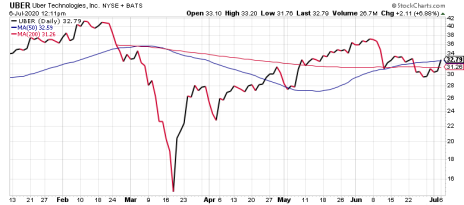Uber stock has been a bust since coming public more than a year ago. Will the company’s newest acquisition change its fortunes?
Coronavirus has been bad for the ride-hailing business. People aren’t going places the way they normally do, and when they do go somewhere, they’re usually driving their own car, or in the car of someone they know and trust. So these have been some lean months for Uber Technologies (UBER), whose original business model and main source of income is predicated on people giving rides to people they don’t know. Enter Postmates, which Uber is buying to make it more diversified—and perhaps stop the bleeding in Uber stock.
On Monday, the company announced plans to buy Postmates, a food-delivery startup, for $2.65 billion in an all-stock deal. The addition of Postmates is meant to bolster Uber’s existing food delivery business called Uber Eats, which is growing fast but accounts for just 22% of America’s meal-delivery sales, or roughly half of rival DoorDash’s share (45%).
Postmates has an 8% share. So even with no growth, the acquisition instantly boosts Uber Eats’ share of the U.S. online meal-delivery market to about 30%, cutting DoorDash’s advantage by a third. Will it be enough to counterbalance the sharp decline in Uber’s passenger traffic, which is estimated to result in a 30% sales decline in the second quarter (earnings aren’t due out until August) and a 7.6% sales decline for the year? Not right away. In full-year 2019, prior to the pandemic, Uber Eats accounted for less than a quarter of Uber’s $13.9 billion business.
[text_ad use_post='129622']
But that has changed drastically, with Eats revenues up 50% in the first quarter and gross bookings for the company’s Rides business cratering, falling 80% in April. While the addition of Postmates might be able to narrow the expected to 7.6% sales decline this year, it won’t be nearly enough to completely fill the void of evaporating sales in Uber’s signature Rides business. The best Uber can hope for on that front is that the virus goes away, stays away this time, and that Americans quickly become comfortable again with the idea of hailing a ride in a stranger’s car soon thereafter.
In the meantime, Wall Street gave the Postmates purchases two thumbs up, pushing Uber stock up more than 6% in Monday’s trading. Even so, UBER is down 21% since coming public in May 2019, and 29% below its post-IPO highs last June. On the bright side, Monday’s big push has lifted the stock back above its 200-day moving average and in line with its 50-day line, which tend to be bullish indicators.
Does that mean you should buy UBER stock now? Perhaps. That August earnings report will be key; if the 30% sales decline turns out to be an optimistic estimate, it could send shares plummeting again. And the longer the virus rages, Uber’s ceiling for growth will remain low no matter how much demand for Uber Eats expands.
But those are short-term concerns—or at the very worst, intermediate-term. In the long run, I believe people will hail rides again, even if it’s not quite at the same rate as it was before the pandemic. And ordering food via an app from your phone is certainly a major growth industry with relatively low penetration. According to a study from Second Measure, only 29% of American consumers have ever ordered from one, up from 23% a year ago (based on data through the end of May).
In 2018, Frost & Sullivan estimated the online food delivery industry at $82 billion in terms of gross revenue bookings and thinks it’s set to more than double by 2025, to $200 billion. And those estimates were before stay-at-home orders and quarantining sped of the process, forcing people to eat all their meals at home instead of going to restaurants.
Thus, I think Uber will remain viable. And at current levels – 21% below its IPO price – UBER stock looks like an intriguing long-term investment. You could hold off and see what happens when the company releases those ugly second-quarter earnings next month, perhaps banking on being able to pick up shares at an even cheaper price. But because this is such a long-term play, that could take more than a year to get back to its IPO price, it almost doesn’t matter when you buy it.
If you believe in the story, now is as good a time as ever to buy UBER stock.
[author_ad]
